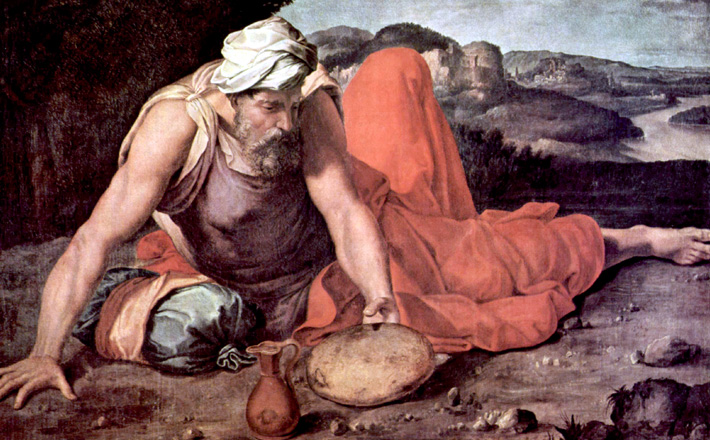Commentary on Psalm 22:19-28
This psalm selection begins with a sharp transition calling upon God (“But you, O LORD,” v. 19a).
The Hebrew construction invites us to emphatically pronounce “you” (referring to God). The urgency of his plea is further stressed by the request that God should hurry (v. 19b).
The psalmist establishes how he relates to God, whom he calls his “help” (“strength” KJV). In the English speaking world, “help” or “helper” is often construed as subservient, but in this psalm he speaks of the kind of help without which he cannot survive. Elsewhere in the book of Psalms, we encounter the same kind of help coming from the LORD, without whom there is no chance of making it through the time of trouble (e.g., Psalm 46:1; 121:1-2).
A glance at the portion that precedes our psalm selection provides us with details of the situation out of whose depth the psalmist cries. The first verse of Psalm 22 also unveils the famous cry of divine dereliction quoted in the gospel accounts where Jesus cries from the cross: “My God, my God, why have you forsaken me?” (Matthew 27:46; Mark 15:34). In the midst of the desperate situations, the psalmist anticipates that God will come and lift him out of agony. He speaks of the travail of “[his] soul” (v. 20a), which he puts in parallel with “[his] life” (v. 20b). The latter in Hebrew is literally “my only one,” insinuating that he is in a life-and-death situation.
The psalmist assembles a set of metaphors to depict his desperate dilemma. They evoke a scene in which the psalmist’s life is threatened from all sides — from the sword, the lion, and a herd of wild oxen (vv. 20-21). The sword, an instrument forged to kill, conjures the terror of war. In v. 20b, it is paired with the dog, which is often featured in battle in antiquity. The lion crouching to devour the psalmist creates the specter of all but certain defeat. Before the goring dash of the wild beasts, no other outcome can be expected.
The psalm takes a luminous turn from despair to a sharing of his deliverance in v. 22. The contour of the radical shift becomes eminently clear toward the end of the verse where the psalmist vows to praise God. He lifts up a word that in Hebrew shares the root with “Hallelujah!” He introduces “brothers and sisters,” who turn out to be a worshipping congregation. They will receive his declaration of God’s name as an act of praise.
The assembly of praise and thanksgiving is further identified as those “who fear the LORD” (v. 23). Clearly, the psalmist no longer fears what he used to fear. Although the same word “fear” is used here, there is a radical shift in its connotation. As is also the case in the rest of the Asiatic world, the psalmist speaks of another category of fear — the kind of fear that is inspired not by trepidation but by adoration. The terms of kinship return in v. 23b, continuing the theme that the psalmist celebrates the shared tradition of holding God in awe.
The psalmist explains the ground of his outburst of praise, stating that he is amazed by the fact that the lofty God has given an audience to a petitioner in a lowly state (v. 24). The degree of his surprise is graphically portrayed through his choice of words like “despise” and “abhor,” both of which carry a sense of disgust and revulsion. Instead of turning away from the abject state of those who are in need, God has acted as their protector and benefactor.
The psalmist describes in v. 24 God’s gracious mode of operation that does not disregard the cry of the poor and the oppressed, only to surreptitiously insert himself as the very one who cried out and experienced God’s deliverance. At the end of the verse, the NRSV has the psalmist shift from the third person to the first person, based on the Greek Septuagint. The psalmist wants to underscore that he is the afflicted one that has received the Lord’s audience.
The prayer for God’s intervention in v. 19 now has been answered (v. 24). The psalmist ascribes the origin of his praise to the LORD, underscoring that he owes it all to God. In response, the thankful poet promises to fulfill his vow (v. 25). In his plan of action, the act of worship will not be private. It will have a communal component, for he is going to praise and pay his vow in the presence of the congregation, who will also share in the praise for God’s graciousness.
We may find a comparable evangelistic thrust in this week’s gospel lesson, in which Jesus says to the Gerasene who was liberated from the oppression of Legion: “Return to your home, and declare how much God has done for you” (Luke 8:39a). The psalmist of Psalm 22, too, converts his personal experience of salvation into a proclamation of the divine benefit granted to “the poor” (“the meek” KJV; v. 26). In this verse, the poor are provocatively paired with “those who seek [the LORD].”
The psalmist anticipates that the cycle of praise will not end. Instead, “all the ends of the earth shall remember” (v. 27). While recollection and recitation are certainly envisioned, the Hebrew verb for “remember” has an extraordinary connotation. The English equivalent tends to focus on the past, but the Hebrew keeps an eye on the present, which is bound to be affected by what is being recalled. The entire world that is reminded of God’s gracious act will make a roundabout to bow down before God in worship.
For the psalmist, this is not a surprising turn of affairs. By contrast, he regards it as the manifestation of what should have been obvious, for the LORD reigns (vv. 27-28). The psalmist’s vision of the universal recognition of God echoes the first lesson from Isaiah 65, in which the prophet delivers the word of the LORD, who says, “Here I am, here I am,” gathering nations that did not know God (v. 1). The prophet and the psalmist together point to God’s sovereignty over all the peoples of the world.


June 19, 2016